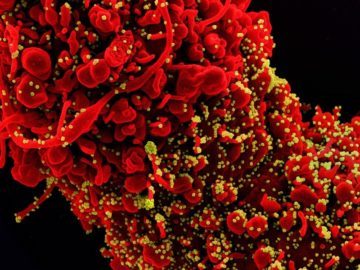Ewen Callaway in Nature:
 Researchers developing the Oxford–AstraZeneca COVID-19 vaccine have identified biomarkers that can help to predict whether someone will be protected by the jab they receive. The team at the University of Oxford, UK, identified a ‘correlate of protection’ from the immune responses of trial participants — the first found by any COVID-19 vaccine developer. Identifying such blood markers, scientists say, will improve existing vaccines and speed the development of new ones by reducing the need for costly large-scale efficacy trials.
Researchers developing the Oxford–AstraZeneca COVID-19 vaccine have identified biomarkers that can help to predict whether someone will be protected by the jab they receive. The team at the University of Oxford, UK, identified a ‘correlate of protection’ from the immune responses of trial participants — the first found by any COVID-19 vaccine developer. Identifying such blood markers, scientists say, will improve existing vaccines and speed the development of new ones by reducing the need for costly large-scale efficacy trials.
“We would like to have an antibody measure that is a reliable guide to protection because it could speed up the licensure of new vaccines,” says David Goldblatt, a vaccinologist at University College London. New formulations of influenza vaccines, for instance, are generally judged by whether they trigger a strong enough antibody response against a viral protein in a relatively small number of people, instead of in large trials that look for reductions in rates of infection. Researchers and regulators hope to do the same with COVID-19 vaccines.
“The power of a correlate in vaccines is profound,” says Dan Barouch, director of the Center for Virology and Vaccine Research at Beth Israel Deaconess Medical Center in Boston, Massachusetts. “If there’s a reliable correlate, then it can be used in clinical trials to make decisions as to what vaccines are likely to work, what form of vaccines are likely to work, or how durable the vaccines are going to be.”
More here.
